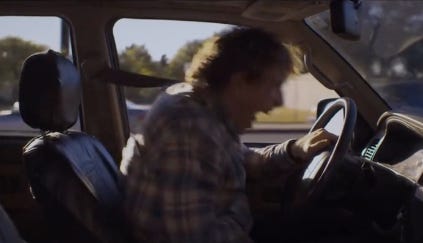"I Think You Should Leave": Honk If You're Dysphoric – And I'm Always Honking
The “Honk if You’re Horny” segment of I Think You Should Leave is slightly unusual in that Tim Robinson’s character is not the unreasonableness-driving engine that propels the sketch forward. He has, by virtue of the “HONK IF YOU’RE HORNY” bumper sticker on the back of his car he’s nearly forgotten about, signaled something about his kinship with and responsibility towards other men. The man stuck in traffic behind him (Conner O’Malley) is driving a huge, busted SUV with rust damage all over the hood; his car-body is broken and weather-beaten and bigger than it needs to be. He sees the bumper sticker and his mouth drops softly open – he’s struck quiet by it, briefly gentled, awash in hope and recognition. He pounds the horn. HONK HONK HONK. “Auuugh,” he screams, mouth huge with teeth, “That’s me!” He points to himself, jabbing a finger into his own chest. “Me!”
O’Malley’s body is stunning in this sketch; he moves like his flannel shirt has been stuffed with straw. Something about the way his shirt folds oddly against the crease of the shoulder suggests inflation, padding, artifice.

Robinson is baffled, indifferent, impatient: His “Me?” is incredulous, dismissive. “Go around.” O’Malley grimaces, his piano-key mouth splitting his cheeks into wrinkled, sobbing folds from nose to chin. He grunts, pants, groans, heaves, hurls, follows Robinson to work, honking from the parking lot, throws himself back and forth between the wheel and the seat. In the absence of relief, he seeks out bodily annihilation, leans into grotesquerie.

Robinson, of course, cannot sleep; there is no peace for one without the other in the contract of mutually-assured horniness. He goes to a funeral; O’Malley pulls up shortly after in the busted truck, unshaven, unwashed, unslept, honking. Robinson, suited, power-walks among the tombstones with a shushing finger held over his lips. “Oh, shit! Shit,” O’Malley growls, leaping out of the car and hobbling away. He scuttles from tomb to tomb, shoulders hunched up around his ears, swinging his arms like bell-ringers. He covers his face and lopes back in shame, he tilts his head up like a dog in appeal and shudders forward.
“Can you help me out or not?”
“How would I help you out?”
“I don’t know! Do you have a solution, like some magazines, or a calendar, or something?”
“Why would I have that?”
“What?!”
“I thought that you worked for a service or a company that helped out guys that are so horny that their stomachs hurt! ‘Cause that’s what I am!”
“There’s no service that does that!”
“Wauuuughhh! Wau-wauuuuuugh! Ahh!”
“Stop moving around!”

The art of masculine withholding is designed to collapse; the collapse is the point. Robinson, huge, besuited, slow-moving, embarrassed, unhelpful, at a remove; O’Malley collapsed, demanding, capering, jabbering, gibbering, incoherent, a walking wound. What O’Malley knows, and insists upon, is an acknowledgement of sameness. Most of the sketches in I Think You Should Leave focus on a single unreasonable person — the little old guy in the focus-testing group who wants a too-small car, Vanessa Bayer with the Sunday brunch bunch, Kate Berlant at the Garfield-house intervention, the hot-dog suit guy at Brooks Brothers, Tim Heidecker at his girlfriend’s game night — slowly drawing everyone around them into a shared sense of hallucination/delusion/despair/cruelty, riff after riff on Shirley Jackson’s “The Lottery”: first it isn’t fair, then it isn’t fair, then they’re upon you.
O’Malley, not fair, goads Robinson into a shoving match, during which the latch to Robinson’s trunk is accidentally triggered, and Robinson’s car-body (small, compact, tight, parked) falls open – the cavity reveals them to be the same, that O’Malley’s instincts were right, that he does have magazines and calendars and something, that all along he knew exactly what O’Malley needed but didn’t want him to have it.
“OHHH-HOOO-HOOOOH, WHAT DO WE HAVE HERE,” O’Malley crows.
“Just pick one,” Robinson says.
“I’ve seen a lot of these,” O’Malley snaps, because the same cure never works twice. Robinson leaves to sing a Katy Perry pastiche called “Friday Night,” which is interspersed with shots of O’Malley, back in his car, a scarecrow returned to its post, flipping through a swimsuit catalog with deep, visible satisfaction. Not jerking off, just flipping – turning page after page in recognition and triumph: There you are. There’s another one. That’s the body I wanted to look at. That one too. He claps a hand to his face, delivered and mollified; he hugs the magazine to his chest.
Pressed jeans, buttoned up
Jeans ironed, slippin' up
Red shoes, walkin' slow
Headphones blarin' three stacks
Sunglasses flarin' out
Dick watch hangin' low
Studded belt pulled taut
Three stacks on the radio
Robinson’s newly-reassured performance, of course, comes from the belief that O’Malley has been sufficiently pacified. But he’s already finished the magazine, and the bumper sticker is still on the car; even the twice-pressed-and-ironed jeans are already slipping up. The relief of slippin’, walkin’, blarin’, flarin’, hangin’ is bookended by pressing and a belt pulled taut. Why ask strangers to Honk If You’re Horny if you don’t want to admit you’ve got magazines in the trunk? Why invite humiliation and discovery after you’ve already put a suit on, why seek out collapse in order to withhold yourself from it? The same reason Christ asks for the cup to pass from him, yet for his own will not to be done – in the hopes that someone else will grant you humiliation, abasement, revelation, need and relief by acknowledging theirs first. I’ll show you mine if you show me yours, but you have to honk if you’re horny first.

